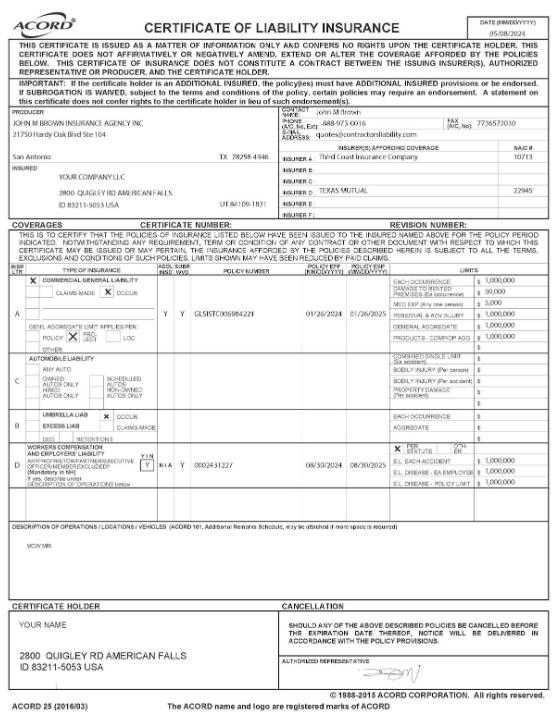In Idaho, it’s really important for contractors to get the right licenses. This guide tells general contractors, electricians, plumbers, and roofers how to do that. It also has information about insurance and bonding.
Licensing Authorities Contact Information
Idaho Contractors Board (for general contractors and other specialized trades):
Web: https://dopl.idaho.gov/con/
Alternate Phone Number: 512-463-6599 (For calls outside Texas)
Alternate Phone Number: 512-463-6599 (For calls outside Texas)
Phone: (208) 334-3233
Alternate Phone Number: 512-463-6599 (For calls outside Texas)
Alternate Phone Number: 512-463-6599 (For calls outside Texas)
Address:
Main Office: 700 W State St, Boise, ID 83702
Licensing Authorities Contact Information
Web: https://web.dbs.idaho.gov/eTRAKiT3/
Alternate Phone Number: 512-463-6599 (For calls outside Texas)
Alternate Phone Number: 512-463-6599 (For calls outside Texas)
Phone: (208) 334-3950
Alternate Phone Number: 512-463-6599 (For calls outside Texas)
Alternate Phone Number: 512-463-6599 (For calls outside Texas)
Address:
Main Office: 1090 E Watertower St, Suite 150, Meridian, ID 83642
Steps to Obtain a Contractor License in Idaho

General Contractors
- Research Local Requirements: Check with city or county offices to determine if a local license is needed.
- Submit Application: If required, complete and submit the local application along with any necessary documentation, such as proof of insurance.

Electricians
- Complete Required Education and Experience: Fulfill the apprenticeship requirements or obtain equivalent experience.
- Pass the Exam: Register and pass the Idaho Electrical License Exam.
- Submit Application: Provide proof of experience, exam results, and insurance coverage to the Division of Building Safety.

Plumbers
- Complete Apprenticeship: Complete an approved apprenticeship program or equivalent experience.
- Pass the Exam: Take and pass the Idaho Plumbing License Exam.
- Submit Application: Submit your application, including proof of experience and exam results.

Roofers
- Check Local Regulations: Verify with local authorities whether a roofing license or registration is required
- Submit Application: If required, complete and submit the local application, including any necessary documentation.
Here’s a table summarizing the contractor registration and renewal costs in Idaho:
| Type of Contractor | Registration Fee | Renewal Fee |
|---|---|---|
| General Contractor | $50.00 (waived if you hold a current public works or construction manager license in Idaho) | $45.00 |
| Electrical Contractor | $15.00 application fee + $125.00 registration | $100.00 |
| Plumbing Contractor | $22.50 application fee + $2,000 surety bond (bond generally costs $20.00 – $200.00) | $108.00 |
| HVAC Contractor | $35.00 application fee + $2,000 surety bond (bond generally costs $20.00 – $200.00) | $150.00 |
Insurance and Bonding Requirements for Idaho Contractors
Idaho contractors must meet specific insurance and bonding requirements to protect their business, employees, and clients:

General Liability Insurance
- Coverage: Required to cover claims of property damage, bodily injury, and personal injury during projects.
- Limits: Typically ranges from $500,000 to $1 million per occurrence, depending on the project size and nature.

Workers’ Compensation Insurance
- Requirement: Mandatory for contractors with employees, covering medical expenses and lost wages due to work-related injuries.
- Proof: Contractors must provide evidence of coverage during licensing and renewal.

Surety Bonds
- Purpose: Guarantees that the contractor will fulfill their contractual obligations.
- Amounts: Varies based on project size and local jurisdiction requirements.
See the Official Document:

Key Exemptions from Contractor Registration in Idaho
Under the Idaho Contractor Registration Act, certain individuals and activities are exempt from the requirement to register as contractors. Here are the key exemptions relevant to contractors:
- Licensed and Regulated Professionals: If you are already licensed, registered, or regulated under Idaho law (such as electricians, plumbers, or engineers), you may not need to register as a contractor, provided your work is within the scope of your licensed profession.
- Employees: If you perform work solely as an employee for a registered contractor, you do not need to register as a contractor yourself. This exemption also applies if you work as a volunteer or part of an educational or charitable program.
- Subcontractors and Independent Contractors: While employees are exempt, subcontractors and independent contractors who are not otherwise exempt must register to perform work in Idaho legally.
- Specific Project Types: Projects deemed minor or inconsequential with a total value under $2,000 are exempt from registration. However, if the project is part of a larger construction effort, or if it’s broken into smaller contracts to evade registration, this exemption does not apply.
- Property Owners: Owners working on their own residential or commercial properties do not need to register as contractors unless they are building with the intent to sell the property within a year of completion.
These exemptions allow certain individuals and activities to operate without the need for contractor registration, making it easier for specific professionals and minor project handlers to work within Idaho’s regulatory framework.
Getting Started with the New Licensing System
The Division of Occupational and Professional Licensing (DOPL) has launched Phase 1 of its new licensing system, designed to make the licensing process smoother and more efficient.
Most users will transition to this new system, while some boards will continue using the old system until November 4, 2024. If your board is transitioning, you’ll need to follow these steps:
- Create an Online Profile: Set up your new account in the system.
- Associate Your License or Registration: Link your existing license or registration to your profile.
- Complete Your Renewal Online: Follow the steps to renew your license through the new system.
Frequently Asked Questions (FAQ)
These are common questions about General Contractor License in Idaho.
No, Idaho does not require a state-level license for general contractors, but local jurisdictions may have their own licensing requirements. Always check with your city or county.
Idaho contractors must carry general liability insurance, workers’ compensation insurance (if you have employees), and in some cases, surety bonds, depending on the project and local regulations.
Coverage limits typically range from $500,000 to $1 million per occurrence, depending on the scope and nature of your work.
Yes, if you have employees, you are required to carry workers’ compensation insurance to cover medical expenses and lost wages for work-related injuries.
A surety bond is a financial guarantee that you will fulfill your contractual obligations. It may be required for certain projects or by local jurisdictions.
Application forms and detailed instructions are available on the Idaho Division of Building Safety’s website and local city or county offices.

